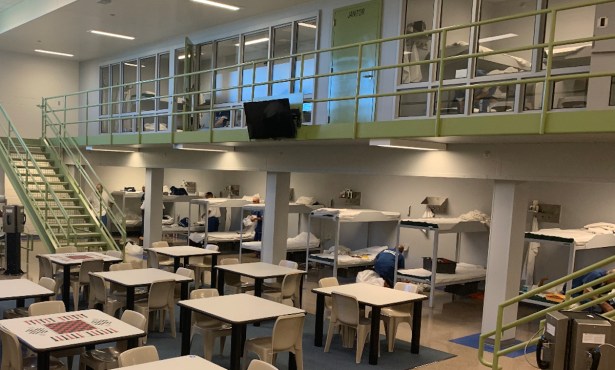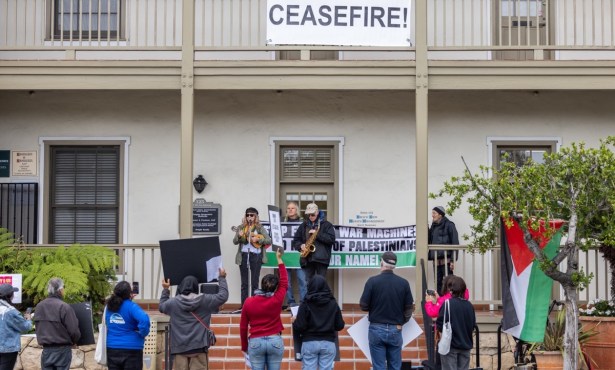Appeals Pour In, but Montecito Has No Water to Spare
Residents Cry Foul over Drought Penalties, Ask District for Mercy
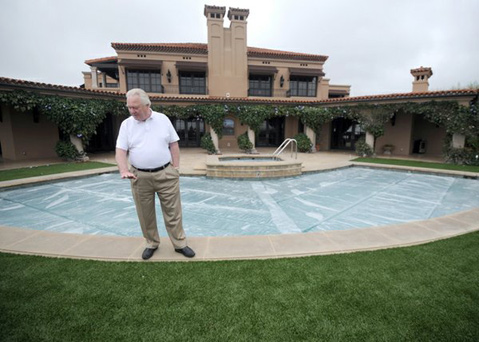
When water rationing went into effect in Montecito this spring, Larry Reiche and Carol Kommerstad-Reiche contemplated selling their one-acre estate on Woodley Road, with its tropical palm trees, swimming pool, Jacuzzi, fish pond, fountain, and 3,500 square feet of manicured lawn.
But it would be a huge hassle to move, they decided, and besides, how could they ever match their view of the islands? So the Reiches retrenched. They pulled up their grass and put in artificial turf, uprooted 15 palm trees, and hired a small army of gardeners at $7,000 weekly to install drip irrigation and native plants. They put down three truckloads of mulch, covered the pool with plastic, and drained the fountain.
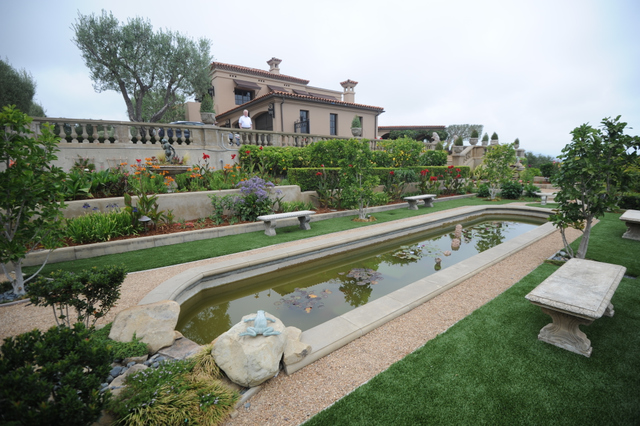
The makeover will cost about $200,000, Larry said, but it should do the trick. The Reiches must slash their water use by at least two-thirds to conform with their monthly drought allocation from the Montecito Water District, and they are aiming to cut back even further. Their dog Lokee is doing his part: He’s been trained not to poop on the plastic turf.
“We’re real proud of the stuff we’ve done,” Larry said. “We know we’re in for it for the long term. We’re really trying, and we’re very conscientious.”
So when the couple returned from a recent trip to find a $300 penalty bill from the Montecito Water District (MWD) for exceeding their monthly water allocation in April by 7,500 gallons, they panicked. Workmen searched for a leak for six weeks, at one point fruitlessly tearing up a section of driveway. Finally, Reiche said, a technician with an ultraviolet lamp discovered a break in the dishwasher line, hidden in the walls. By that time, they had received a $480 penalty bill for May.
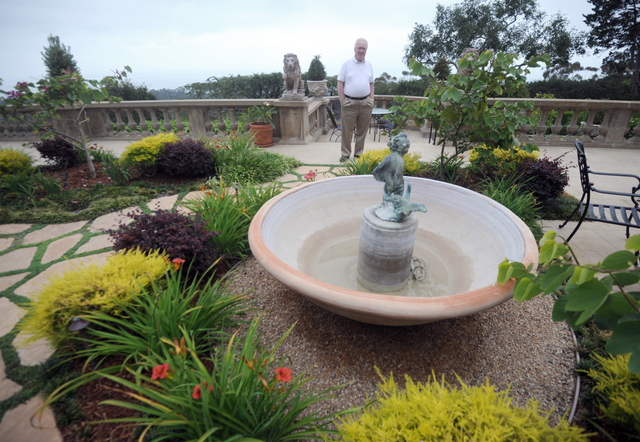
Now the Reiches have joined dozens of customers asking the district to waive their penalties because of leaking irrigation pipes, running toilets, breaks in water service lines, and faulty swimming pool valves. Generally, district officials said, the water board waives the penalties — but not the cost of the leaked water — if homeowners quickly make repairs and can document them.
At the same time, because of Montecito’s shrinking reservoir supply, the board has denied all appeals for new water meters and higher water allocations. As of last February, new hookups are banned in Montecito, Summerland, and Toro Canyon, where the district serves a population of 13,500 people.
Since April 1, the district has assessed $1.1 million in penalties against customers who exceed their allocations. The penalties make up for the precipitous drop in water sales under rationing, and they will help pay for supplemental supplies, said Tom Mosby, the district general manager. To date, the board has heard 43 appeals, he said. Sixty more are under review, and new appeals are coming in daily, straining the resources of the small district staff.
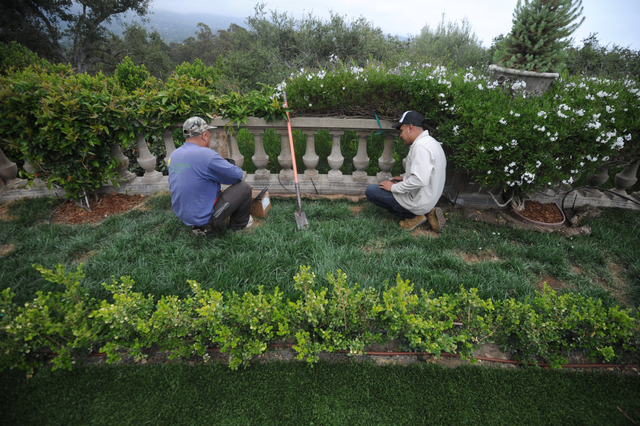
At a meeting on Tuesday, several residents asked the water board to lift the penalties, raise the rates for the highest users, and buy more water. Dozens of Montecitans are trucking in daily supplies to avoid triggering penalties, they said, and that money could be going to the district. Trucked-in water costs about $70 per unit, compared to $4.36 per unit of water delivered by the district at the lowest residential rate. (A unit of water is 748.6 gallons.)
Virginia Castagnola-Hunter, who lives at Sycamore Canyon and East Valley roads, asked the board, “Why don’t we buy as much water as we can right now?”
The board said availability, not money, was the obstacle.

“Don’t think we haven’t done everything we can,” said board director Richard Shaikewitz. “We’ve made offers and countered and negotiated. But county water agencies are saying, ‘Unh-unh.’”
This year, the district was able to buy supplemental water for $1.4 million from agencies in Santa Ynez, Vandenberg Air Force Base, and the Central Valley, officials said. The water is not here yet, they said, but it may help avert further cutbacks if the drought persists into next year.
“We’re in a water shortage emergency because we have a finite amount of water,” board president Darlene Bierig said in an interview. “We can’t go raising allocations, whether it be an agricultural user who’s losing a crop, or a commercial user who is in the process of expanding a business, or residential users who have enormous amounts of money invested in their landscaping. A lot of people are really hurting, but we just don’t have an additional amount of water to give out. The pain is being shared in all sectors.”

Letters pouring in to the district in recent weeks paint a picture of frazzled residents struggling to adapt to the new regime.
“Please accept my apology for being so terribly upset when we spoke on the phone this afternoon …” Carol Kommerstad-Reiche wrote a month ago. “I am still extremely concerned about the value of my property being greatly diminished by the loss of valuable landscaping which will now most likely have to be left to die …” The Reiches say they now believe their estate is worth more because it is drought-resistant. Their appeal is pending.
Jacaranda Summerfield of Torito Road wrote, “We all shower every other day now, have buckets in the sink to collect any used water, I have a brown scorched lawn, my garden is hardly existing on basic water … and here I am with this awful penalty… Please don’t put a blotch on my record …” The board waived Summerfield’s $1,920 in penalties.
On Arroqui Road, a district water meter reader alerted Robert Truskowski and Maureen Gallen in April of high water use. They discovered an underground leak and wrote, “Anyone looking at our property can see we have been trying extremely hard to cut back on our watering. Our grass is very brown and almost dead … a fine of approximately $3,500 causes an undue hardship.” Their appeal is pending.

Jeffrey and Katie Graham of Portola Valley, California, asked the water board to lift the ban on new water meters, saying they had spent two years and a lot of money buying a five-acre lot on Montecito Ranch Lane in Summerland and drawing up the plans for a new house. The Grahams said they wouldn’t put in a lawn and were willing to remove the swimming pool from their plans.
“We feel it would be very unfair for MWD [to] prevent us moving forward with the construction of our retirement dream home,” they wrote. But the board denied the Grahams’ appeal. In an earlier letter to the couple, the district stated, “… there is insufficient water to serve current customers let alone new customers.”
The board also turned down Richard Stackhouse, the owner of Stacky’s Seaside, who requested a higher water allocation for his fast-food operation on Lillie Avenue in Summerland. He was advised to lock his restroom and allow only patrons to use it.
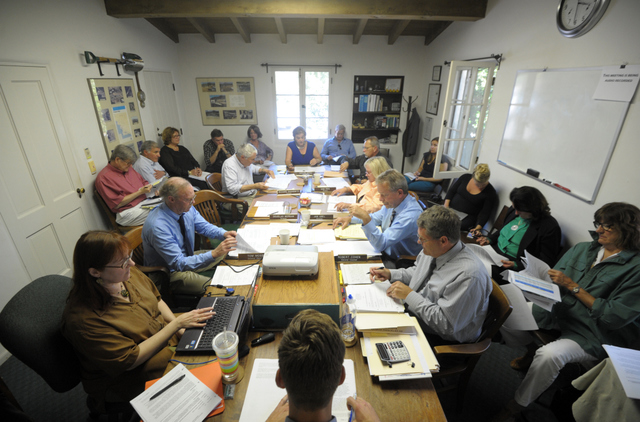
Dan Van Hirtum, owner of the Café Luna on Lillie Avenue, asked for a higher allocation on behalf of the café, a jewelry store, a small office, and a hydroponics water tower vendor that share two water meters on the same property. According to district files, the businesses are using three times their water allocation and were assessed $2,670 in penalties for April and May. Their appeal is pending.
“We brew coffee, we must wash silverware and dishes according to the standards we are required to follow by the Santa Barbara County Health Department, we are required by the same entity to have a restroom facility with hot and cold running water and etc.,” Van Hirtum wrote to the district. “… I am respectfully asking for a reconsideration of the number of units (of water) allotted to this property so that we may remain in business.”
The board denied an appeal by Brian Tappeiner, co-owner of Valleyheart Gardens Inc., a 65-year-old wholesale nursery on Toro Canyon Road, even though he was not asking for more water. Tappeiner wanted to redistribute his monthly allocations so as to keep 75,000 fuchsias and begonias alive in greenhouses. The distribution of agricultural allocations is based largely on the pattern of water use in lemon and avocado orchards, and “we are so different from that,” Tappeiner said. To make ends meet, he said, he has resorted to mixing district water with well water that is high in salts.

“They dropped my allocation in winter months way below what would sustain us,” Tappeiner said. “They’re a little stiff. They said, ‘If we made an exception for you, we’d have to make it for everybody.’ I thought I had a pretty logical argument, but it didn’t seem to carry much weight.”
The board also said no to Hadi and Barbara Makarechian, who asked for a temporary increase in allocation and a waiver of penalties, on the grounds that the construction work on their house on Channel Drive was using a lot of water for concrete and dust control. On a five-acre ranch on Asegra Road, the board denied Susannah Forest a higher allocation to keep 300 specimen trees alive. And the board turned down John Horak, who requested a higher allocation for two homes on Paso Robles Drive that are on different lots but share a single water meter.
“I hear the desperation that homeowners feel,” board director Jan Abel said at an appeals committee hearing last week. “During the drought, everyone is experiencing a loss. We may get to the point where there is a ban on all outside water or we have to cut allocations further, by a third. These things are looming.”

